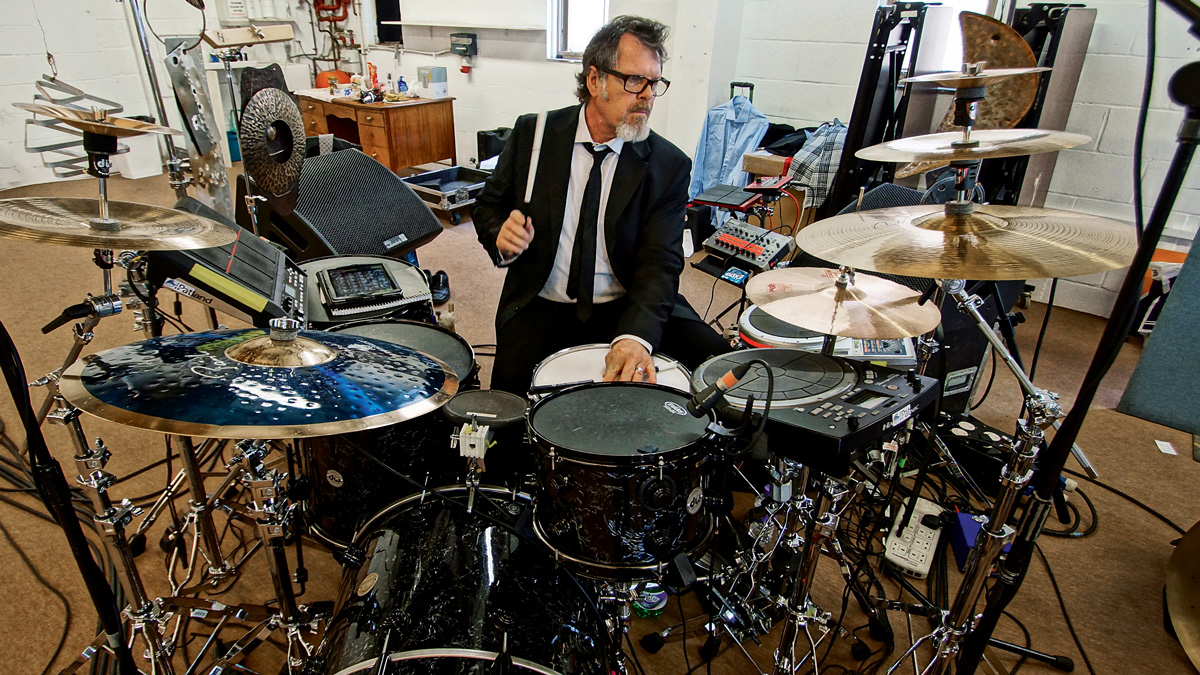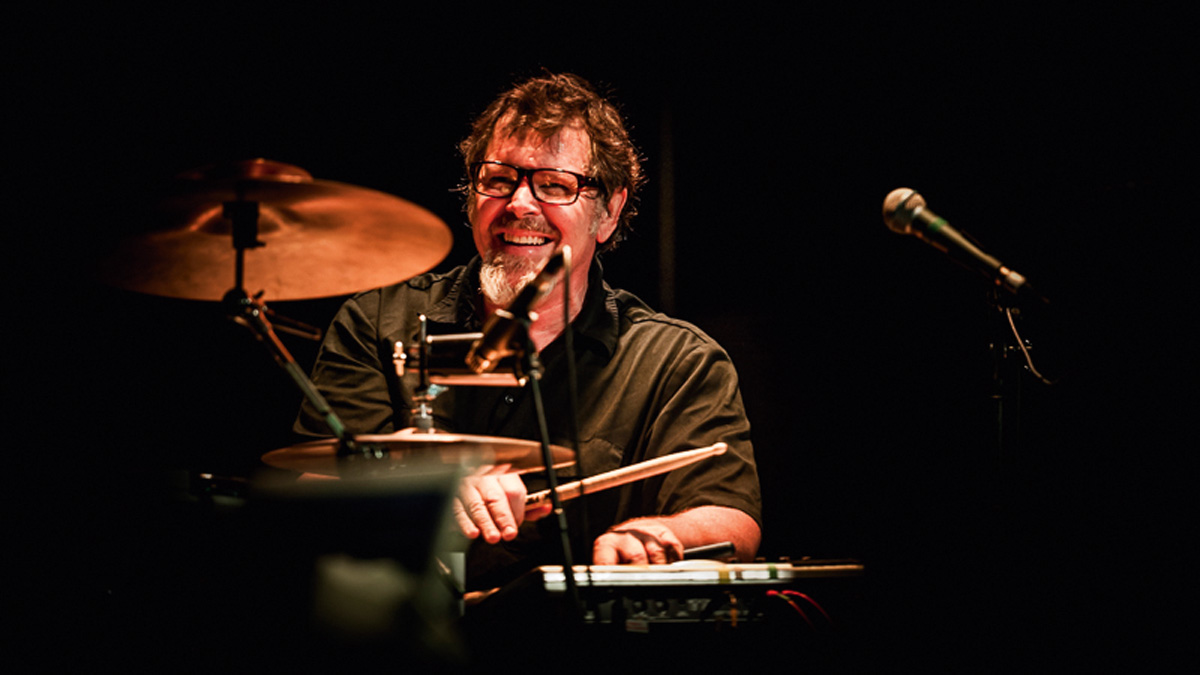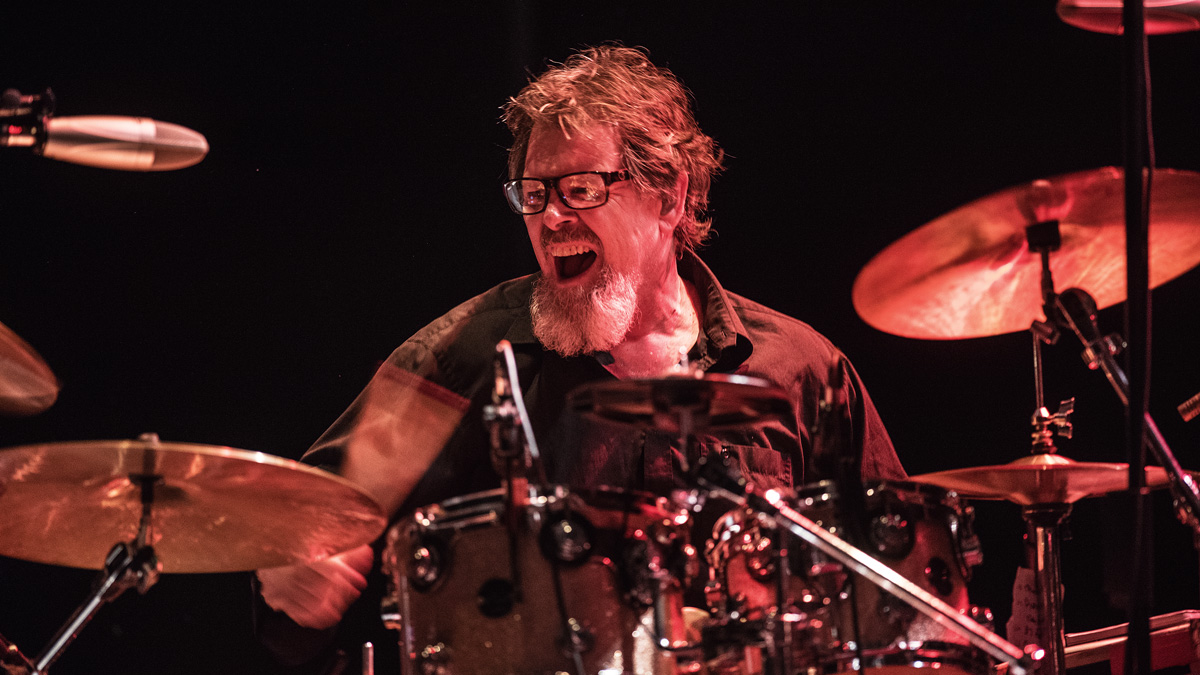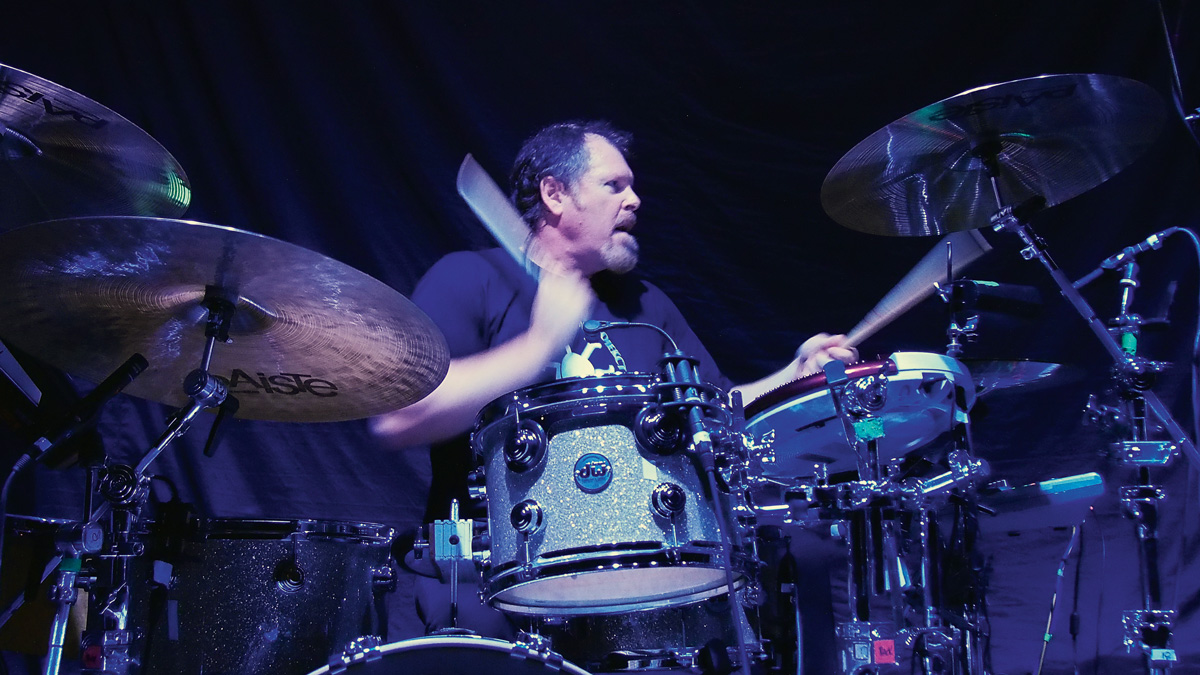Pat Mastelotto talks 40 years at the top and triple drumming with King Crimson
Prog master reflects on a sublime career

Early days
In 1974, not yet 18 years old, Pat Mastelotto moved from Northern California down to Los Angeles, dreaming of becoming a session musician.
He found work with producer Mike Chapman before landing an audition for the band Mr. Mister. “By accident, at my audition the bass player I was bringing with me didn’t show up, so Richard Page the singer played with me and it was instant chemistry. Within a half-hour we were high-fiving and we were a band,” says Mastelotto.
The group’s 1985 album welcome to the real world produced two us Number One singles - Broken Wings and Kyrie - giving Mastelotto’s profile a huge boost.
“It brought me credibility,” says Mastelotto. “I got a lot of other session work after that and it gave me some financial security. I was able to buy a house. The Misters were a very democratic band, we shared production and a lot of the songwriting, so as a drummer it was a very happy place to be. We’re friends still to this day.”
The Misters were a very democratic band, we shared production and a lot of the songwriting, so as a drummer it was a very happy place to be.
Mr. Mister split in 1990 and three years later Mastelotto began his long musical relationship with King Crimson’s guitar genius Robert Fripp, playing live with Fripp and David Sylvain. In 1994 Mastelotto joined King Crimson, playing at different times alongside Bill Bruford, Gavin Harrison, Bill Rieflin and Jeremy Stacey. Based in Texas, he maintains a tireless output balancing sessions with different progressive rock projects - in the last two years alone he’s released albums with Stick Men, O.R.K., Komara and King Crimson.
When drum machines arrived in the ’80s, were you happy to embrace the new technology?
“I embraced that for sure. I embraced it in the ’70s with the Pollard Syndrum or the Synare early drum machines. I was lucky to work with Bob Easton, who developed some of the early sequencers, and Michael Boddicker. Mike Chapman incorporated drum machines right at that time, he’d been working with Blondie on Heart Of Glass. When I auditioned for the Mr. Mister guys, they owned a Linndrum because they’d gone a year auditioning drummers and after we finished the audition they sent me home with the Linndrum.
“They said, ‘We don’t need it anymore, we’ve got you so you take this.’ Years later I asked Richard Page, ‘How did I get that gig? How did it happen so fast?’ He said, ‘Dude, you were the first and only guy who could play to the end of the song with the drum machine. Every other guy we auditioned fell out of time.’ I had some experience doing that from working with Mike Chapman where you just treat the drum machine as your friend, it’s your percussion buddy.”

Your kit includes electronics now with Komara and O.R.K.
“It depends on the gig. With the current King Crimson, there’s no sense for me to use much of a beat box. We have Gavin and Rieflin and Jeremy, great drummers. There are plenty of guys to play the parts, but in situations where I’m by myself then I will look to the drum machine to be my buddy, to fill in a shaker or a loop or a kick-drum part. Like in Broken Wings, the Mr. Mister hit, I didn’t play the kick drum. I sequenced the kick drum on the Linndrum and the bass line was sequenced as well. That was the tightest way to give that track the identity that it needed.
“A lot of times I might play the dominant beats, the downbeats, the ‘1’s and ‘3’s but not the 16ths, not the skippy beats. With Broken Wings, it straight-up plays the kick drum pattern, I play top kit over that. We had another hit called Is It Love that had a lot more active bass drum and on stage it worked out best that I played the dominant beats with the acoustic drum and then the fill-in beats, the 16ths, the off-beats would come from the drum machine. I’d just take away the beats that I chose to play so I didn’t have to worry about flams.”
I’ve heard Robert say many times that the drummer defines the band. You put a jazz drummer in a rock band, they’re a jazz band. You put a rock drummer in a jazz band, they’re a rock band.
Has Robert Fripp ever articulated why he wants more than one drummer in King Crimson?
“Not really would be the quick answer. He never specifically tells the drummers what to do. He’s like a casting agent. He puts a couple of personalities together. It was obvious with Bill [Bruford] and I that I was the more foundational rock drummer and Bill would be the more skittery rhythm terrorist. This, in a way, satisfied Robert’s needs. We didn’t talk about it directly but that’s the way I view it and I think it really goes back to Robert Fripp’s love of Michael Giles’ drumming, the original King Crimson drummer.
“Michael Giles could cross over from rock to jazz and I’ve heard Robert say many times that the drummer defines the band. You put a jazz drummer in a rock band, they’re a jazz band. You put a rock drummer in a jazz band, they’re a rock band. So I know what Robert’s saying. He wants the heaviness, sometimes he refers to it as ‘a fat, hairy ape on drums’. He wants that primal thing, but he still wants a sophisticated swing drummer as well.”

Tweaking the sound
Do you adjust the sound of your kit depending on the gig?
“Totally, and the new three-drummer King Crimson is a really good example of that because I’m mixed a little bit off to one side and Gavin is off to the other side, so if you think of Gavin having the high octobans and the higher bell cymbals over his hi-hat, he’s creating very much a picture in the right speaker, if you will. My picture is very much in the left speaker so a bigger cymbal or a bigger floor tom can answer that, or a few high cup chimes and things to correspond and to ricochet back and forth from his side of the stage.
“I definitely think about sound as much as the part. Sometimes you’re going to use something more like a timpani or a parade drum than a conventional sounding rock’n’roll bass drum. Broken Wings, Kyrie, all those songs, the same things there - how heavy can the drums be? We were a four-piece so I could make the drums much heavier, I used a Simmons SDS-5 in those days so there is a lot of that on that record, really big fat tones but we can’t quite use those in the current King Crimson. There is so much activity that they have to be shorter sounds.”
How do three drummers work together? Do you all feel time the same way?
“No, I don’t think we do and we make strategies to avoid flams. We don’t play a lot of unison bass drums, that’s one of the first things when you’ve got two or three drummers - how many bass drums can I eliminate? It’s very much like playing with a drum machine as I described back in the ’80s. You’re going to share all those notes down there so you’ve got to take some away. We do feel time a little bit different. Gavin is a little bit more on the backside, I’m a little more on the frontside. I don’t know how to describe it exactly, it’s just something you do.
We don’t play a lot of unison bass drums, that’s one of the first things when you’ve got two or three drummers - how many bass drums can I eliminate?
“I’ve had people say how laid-back I play when I do sessions but I don’t think that’s necessarily true. I think I play a little on the front edge, maybe a little bit leaning ahead but not rushing. There’s a difference between pushing and rushing, I don’t want to accelerate the time, I just want to lean on it. And the opposite way sometimes too, you need to feel it pull back but that’s honestly more intuitive. I grew up playing with records, I didn’t see a metronome until I was about 18 years old so I’m not like these kids I see today out on the marching drum corps.
“They just bury that click track, it’s unbelievable. To me the click was always sort of a reference. It wasn’t like I always had to suffocate it and be right on top of it, it was just a reference point. I was doing a session once and a lot of times I step outside the door of the session to listen to playback because I can hear my bass drum better. If I’m inside I don’t notice the time so much, I’m listening to the smaller details, so I step outside the door. Jeff Porcaro walked by and he said, ‘What’s up, Pat?’ I said, ‘Dude, I’m listening to my track here and it just sounds like all my kick drums are ahead.’ And he says, ‘That’s what you want, man.’ I said, ‘What?’ He’s like, ‘No, you want your kick drum to be a little ahead and your snare to be a little behind. That’s why it feels so good.’
“I never thought about it like that, I just tried to make it feel right, I didn’t think about who’s ahead and who’s behind. Jeff said, ‘If your kick is a little ahead, it’s rock’n’roll.’ Way back when Mike Chapman would hire me for sessions instead of hiring an LA session guy, he said he wants angst in his tracks, he wants a punk drummer, he wants enthusiasm and energy. We want that from a drummer, right? Not just sitting in the pocket but pushing it. Hopefully O.R.K. pushes a bit like that. It’s fun because the guitar player is very edgy in that band and then Colin the bass player is the other way, a very laid-back player.”

'I'm from the rock generation...'
When did improvisation come into your playing?
“I didn’t listen to that much jazz as a kid growing up. I’m from the rock generation, the Beatles, Cream and Hendrix and all that. Open improvisation, as we think of it now, you always do that as a musician but when you work with Robert and some of the characters I was working with, it became more open. I don’t want to call it free jazz but it wasn’t just like a blues jam. It was just a very vibrant music time in the early ’90s when electronica was really exploding, Aphex Twin, Squarepusher, all these things that explored using a computer or beat box ideas and then collaborating as a human with the machine.
“That really appealed to me so it was good timing that the King Crimson ProjeKcts came along and these were really set up for exploration for future crimson ideas, so we would hit the stage with no prepared material. I was doing that locally with Mastica and some other projects I had here in Texas. It’s usually the exploration musicians do in the garage with just a couple of your buddies. You don’t usually step in front of 500 people and do it on stage but that’s what we did. It’s the idea that the pointed stick of public ridicule will push you into doing something. That’s a bit of Robert’s philosophy there.”
Open improvisation, as we think of it now, you always do that as a musician but when you work with Robert and some of the characters I was working with, it became more open.
Does that require confidence in your fellow musicians?
“I think the trust thing is really important. I got to work with John Paul Jones and I always thought Zeppelin was amazing in the way that they did improvs. In the middle of songs they would just go left into some Elvis tune or something. I mentioned that to John Paul Jones, I said, ‘How could you do that?’ He said, ‘The only rule was, where anyone went we all followed.’ So that’s the trust. When I worked with Robert and [guitarist] Trey Gunn, Trey was awesome at that. Wherever I would go, Trey would be with me. It wasn’t like you’d go out on a tangent and be left out there. It’s a beautiful thing when your buddies are in a band, everybody’s helping to nurture something to happen.”
MusicRadar is the number one website for music-makers of all kinds, be they guitarists, drummers, keyboard players, DJs or producers...
- GEAR: We help musicians find the best gear with top-ranking gear round-ups and high-quality, authoritative reviews by a wide team of highly experienced experts.
- TIPS: We also provide tuition, from bite-sized tips to advanced work-outs and guidance from recognised musicians and stars.
- STARS: We talk to musicians and stars about their creative processes, and the nuts and bolts of their gear and technique. We give fans an insight into the craft of music-making that no other music website can.
